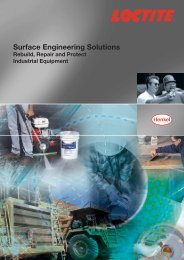Structural Bonding
Structural Bonding
Structural Bonding
You also want an ePaper? Increase the reach of your titles
YUMPU automatically turns print PDFs into web optimized ePapers that Google loves.
114<br />
Thread Sealing<br />
Choosing a thread sealant<br />
When choosing a thread sealant, there are several factors<br />
that need to be considered. The single most important<br />
question is substrate. Are you dealing with plastic threads,<br />
metal threads, or a combination of both? Plastic threads<br />
usually require a different sealant than metal threads. In<br />
some instances, the environment becomes a factor. If the<br />
application requires the sealant to be in contact with harsh<br />
chemicals, then a chemically resistant sealant should be<br />
chosen. In other cases, the type of thread comes into play.<br />
For example, if the fitting to be sealed has large coarse<br />
threads, then a sealant with more gap fill should be chosen.<br />
Similarly, a low viscosity sealant would be better suited for<br />
fine threads. When choosing a sealant, it is important to<br />
consider all of the factors. The following chart will help<br />
guide you through your choices.<br />
Why use a solvent-based sealant on plastic fittings?<br />
Anaerobic sealants work when they harden in the absence<br />
of air and the presence of a metal surface. On the other<br />
hand, solvent-based sealants harden when the solvent<br />
evaporates. In the case of plastic fittings, you must rely on a<br />
solvent-based sealant since there are no metal surfaces to<br />
cure the adhesive. Similarly, in those cases when joining<br />
metal to plastic fittings, solvent-based sealants are<br />
recommended. Because only half of the substrate is metal,<br />
anaerobic sealants may produce inconsistent cure.<br />
This chart should not be used to specify products without specific<br />
testing. It is recommended that you conduct on-part testing to<br />
ensure product performance before specifying any thread sealant.<br />
Loctite® Adhesives and Sealants Product Specialists are available to<br />
assist you with new product designs, or to help you re- engineer an<br />
existing application for improved performance and cost savings.<br />
They can also set up testing of your parts at the Henkel Customer<br />
Engineering Center. For application assistance, call 1-800-LOCTITE<br />
(562- 8483) or visit www.loctite.com and select “Contact Loctite.” In<br />
Canada, please call 1-800-263-5043.



